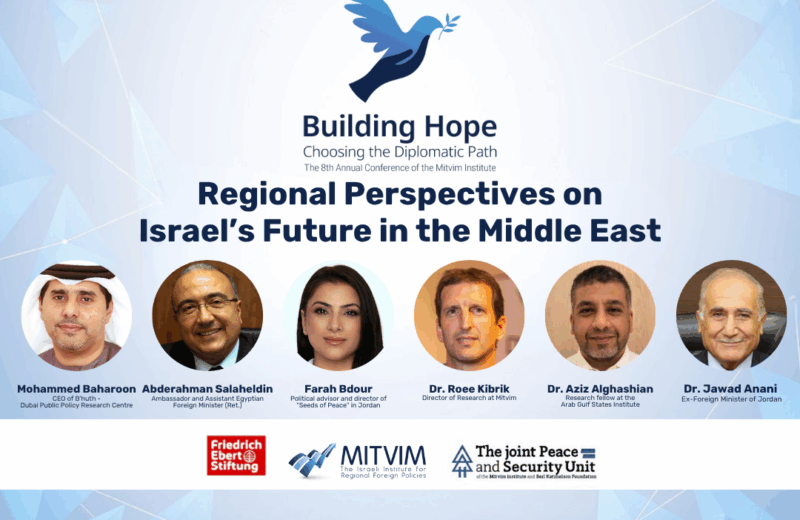 / All Events
/ All Events
Summary of the regional panel moderated by Dr. Roee Kibrik at Mitvim’s 8th Annual Conference on Regional Foreign Policy, held at the Yitzhak Rabin Center, November 2025 | In partnership with Friedrich Ebert Stiftung Israel.
The panel was held and recorded via Zoom interviews with speakers from across the Middle East.
Dr. Roee Kibrik, Director of Research at Mitvim, moderated an exceptional regional panel bringing together experts and policymakers from Jordan, the UAE, Saudi Arabia, and Egypt. Kibrik opened the discussion by noting that Israel is at a critical juncture: Arab states succeeded in uniting to help end the fighting in Gaza, yet the path from here toward real stability and a structured diplomatic process remains unclear.
“Especially now,” Kibrik said, “we must understand how reality looks from across the border – what regional states see, what frightens them, and what opportunities they identify.”
The first speaker, Dr. Jawad Anani, former Foreign Minister of Jordan, delivered a stark warning:
“It is extremely difficult to convince people that peace is possible. As long as the situation on the ground continues to deteriorate – Jordan is harmed as well. If Gaza collapses again, it will drag all of us in with it.”
Dr. Aziz Alghashian, Senior Policy Fellow at Mitvim and at the Gulf States Institute in Washington (GSIW), cautioned against the illusion of a “New Middle East”:
“What exactly is new here? Yemen is still burning, Lebanon has not recovered. The danger is that the chaos in Gaza and the West Bank will be sucked into the broader regional instability. For Saudi Arabia, this is a nightmare scenario.”
From Dubai, Mohamed Baharoon, Director-General of the B’huth research center, pointed to a more positive development. For the first time, he argued, the region is witnessing the emergence of a collective security framework – with states willing to invest directly in Israel’s security.
He described the April 12 interception of Iranian missiles as “a prototype of a Middle Eastern NATO,” an unprecedented model of cooperation.
But Baharoon added that the picture is far from perfect:
“Israel needs the region more than the region needs Israel. The India–Middle East–Europe Corridor (IMEC) could run through Haifa – but just as easily through Beirut, Tartus, or other places.”
Farah Bdour, Jordanian political adviser and conflict-resolution expert, highlighted the complexity of this “positive regional moment”:
“The joint air-defense success was impressive – but it exposed how deeply Israel depends on Arab airspace cooperation. Without it, Israel’s defense system would have collapsed.”
Bdour stressed that Israel’s strike in Doha severely damaged regional trust:
“Israel is shaping the security map – but in a way that distances it from the very partners it relies upon.”
She argued that the weakening of Iran’s proxy networks actually creates a window of opportunity for a new regional security architecture – but only if security and diplomacy advance together, “not separately, as they do today.”
Ambassador Abd Al-Rahman Salah Al-Din, former senior Egyptian diplomat and adviser to Egypt’s foreign minister, emphasized Egypt’s decisive role:
“We are ready to lead. Egypt will host a Gaza reconstruction conference, help establish a Palestinian technical administration, and work with the U.S. and other partners to build a regional security framework.”
But he warned: “Israel is not safer today than it was two years ago. Every actor Israel struck can rebuild its strength in five or ten years.”
Anani and Bdour reinforced the Jordanian message:
“Israel cannot survive long-term without normal relations with its neighbors. Jordan’s peace with Israel has lasted 31 years – not because of documents, but because of real interests.”
Baharoon explained the Emirati position:
“We want to see Israel behave like a responsible state that respects international law. When the establishment of a Palestinian state ends the occupation, there will be no place for resistance or armed groups.”
Dr. Alghashian clarified the conditions from Saudi Arabia and the Gulf:
“Full Israeli withdrawal from Gaza, and a clear political pathway toward a two-state solution. The Palestinian Authority is essential – it provides legitimacy.”
The panel closed with a shared message echoed by all speakers:
Israel cannot – and should not – act alone.
It must speak with its neighbors, not only at them. As Alghashian put it:
“There are narratives that try to divide us, but when people share principles and goals – they can overcome polarization.”
Moderator Dr. Kibrik concluded by thanking the speakers for their candor. Their remarks revealed a rare combination of criticism, genuine regional concern – and real willingness for partnership, should Israel choose a diplomatic path.
Mohamed Baharoon captured the panel’s central message:
“Perpetual war does not have to be Israel’s destiny in this region. There are windows of opportunity – but they will not stay open forever.”


